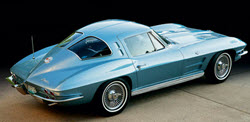The role of Zora Arkus-Duntov, the “Father of the Corvette.”
The Early Life of Zora Arkus-Duntov
Zora Arkus-Duntov was born on December 25, 1909, in Brussels, Belgium, to a family with Russian roots. Although his birth was in Belgium, his upbringing was spread across different parts of Europe, mainly in Russia and Paris. This cosmopolitan upbringing exposed him to diverse cultures and technologies, likely contributing to his later successes in engineering and design.
From a young age, Arkus-Duntov exhibited a keen interest in engineering and mechanics. His curiosity about how things worked led him to experiment and tinker with various mechanical devices. This budding passion naturally guided him towards formal education in engineering. It was this passion that eventually led him to pursue a higher education at the esteemed Charlottenburg Technical University in Berlin, one of the top technical institutions of the time.
At Charlottenburg, he focused on honing his skills in engineering disciplines, which included automotive engineering—a field that was rapidly evolving at the time. The foundational knowledge and technical expertise gained during his studies equipped Arkus-Duntov with the tools to undertake complex engineering challenges.
After graduating, Zora Arkus-Duntov and his brother, Yura, embarked on a business venture together. They established a successful enterprise that specialized in building and supplying custom engines and automotive parts. This business allowed them to apply their technical know-how practically and innovatively, serving various clients seeking specialized automotive solutions. Through this venture, Arkus-Duntov further deepened his understanding of engine mechanics and performance capabilities.
The Move to the United States
The 1940s marked a period of global transition, heavily influenced by the events of World War II. For Zora Arkus-Duntov, this era connected with significant personal and professional changes. Moving to the United States during this decade represented a pivotal chapter in his life. The move allowed him to be at the center of the burgeoning North American automotive industry, which was gaining considerable momentum due to post-war technological advancements and consumer demand.
In the United States, Arkus-Duntov applied his engineering expertise in various capacities. His skills were especially valued during the war effort where he served as a flight engineer, contributing to the development and maintenance of military aircraft and equipment. This role not only utilized his mechanical skills but also broadened his experience in high-performance machinery, ultimately laying the groundwork for his future achievements in the automotive world.
Joining General Motors
Zora Arkus-Duntov’s career took a substantial turn in 1953 when he joined General Motors (GM), one of the leading automotive companies in the world. His tenure at GM marked a period of significant contributions to the automotive industry. His foremost contribution was to the Chevrolet Corvette, which had been introduced by GM in the same year but struggled initially to capture the market.
Recognizing the potential of the Corvette, Arkus-Duntov undertook the challenge to transform it from a mere style statement to a performance powerhouse. His engineering insights and dedication were instrumental in transitioning the Corvette into a respected and competitive sports car. At GM, he quickly became a key figure whose influence would reshape the company’s approach to performance vehicles.
Innovations and Contributions
Zora Arkus-Duntov’s tenure at General Motors was marked by numerous innovations that significantly bolstered the Corvette’s performance and appeal. One of his most notable contributions was the introduction of the small-block V8 engine, which became synonymous with the Corvette’s high-performance image. This engine, a marvel of engineering, delivered superior power and speed, distinguishing the Corvette in a competitive automotive market.
Beyond the engine improvements, Arkus-Duntov was deeply involved in enhancing the car’s aerodynamics and handling capabilities. He recognized that speed was not just a matter of raw power but also involved how well a vehicle could maintain velocity and stability. His efforts led to better, more streamlined designs that allowed the Corvette to cut through air with less resistance and handle more nimbly on the road and track.
Importantly, Arkus-Duntov’s vision was not limited to engineering innovations; he also had a broader strategic perspective. He was a passionate advocate for establishing a European racing program that would allow the Corvette to demonstrate its capabilities on an international stage. By doing so, he aimed to bolster the Corvette’s stature as a world-class sports car, capable of competing with European manufacturers on their home turf.
Beyond product development, Arkus-Duntov left a lasting impact on the corporate culture at General Motors. His commitment to pushing the boundaries encouraged a culture of innovation and performance excellence. He inspired engineers to think beyond conventional wisdom, to experiment, and to pursue groundbreaking advancements in automotive technology.
Legacy as the “Father of the Corvette”
Even decades after his work at General Motors, Zora Arkus-Duntov remains a pivotal figure in the history of the Corvette. His sustained efforts and influential role in transforming the Corvette from a struggling model into a symbol of American automotive excellence earned him the enduring title of “Father of the Corvette.” Under his guidance, the Corvette not only captured significant market share but also evolved into an iconic sports car recognized globally.
His legacy is celebrated not just within the walls of General Motors, but also across the automotive industry. A testament to his enduring influence is his induction into the Automotive Hall of Fame—a fitting recognition for his contributions to automotive history. Arkus-Duntov’s legacy continues to inspire engineers, designers, and automotive enthusiasts alike, serving as a testament to the power of innovation driven by passion and expertise.
In conclusion, the journey of Zora Arkus-Duntov from a curious engineer to a legendary figure in the automotive industry underscores the themes of passion, innovation, and the relentless pursuit of excellence. Through his pioneering work, he not only transformed the Chevrolet Corvette into a symbol of engineering triumph but also established a standard of performance excellence that continues to define the vehicle today. His story remains a source of inspiration for those fascinated by the intersection of engineering and the art of automaking.



